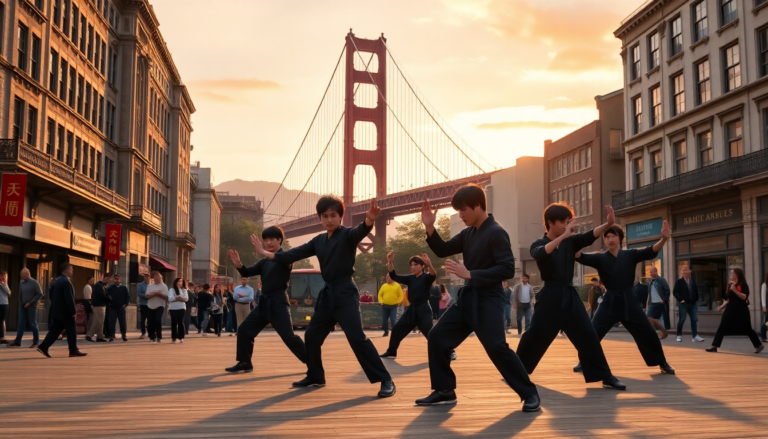Argomenti trattati
Bruce Lee, born Lee Jun-fan on November 27, 1940, in San Francisco, was not just a martial artist; he was a revolutionary figure who transcended the boundaries of culture, sport, and cinema. With a captivating charisma and unmatched skills, Lee became a global icon, reshaping the representation of Asian characters in Hollywood while promoting the art of martial arts worldwide. His innovative philosophy, Jeet Kune Do, combined various fighting styles, emphasizing practicality and efficiency over tradition. This article explores the life of Bruce Lee, highlighting his contributions to martial arts, film, and cultural exchange.
Early life and introduction to martial arts
Bruce Lee’s journey began in the bustling streets of Hong Kong, where he was introduced to the film industry at a young age as a child actor, thanks to his father, a Cantonese opera singer. Growing up in a world rife with gang conflicts and street fights, Lee honed his skills not just through formal training, but also in the chaotic environment of his neighborhood. At the age of 12, he began training in Wing Chun under the legendary Ip Man, where his dedication and natural talent became evident. Lee’s early experiences laid the foundation for his future as a martial artist and filmmaker, as he began to blend street-fighting techniques with traditional martial arts.
Move to America and martial arts evolution
In 1959, seeking new opportunities, Lee moved to the United States, where he enrolled at the University of Washington. Here, he opened his first martial arts school, teaching Jun Fan Gung Fu, his interpretation of Wing Chun. His unique approach attracted a diverse group of students, breaking racial barriers in a predominantly white sport. Lee’s participation in martial arts competitions further showcased his talents, capturing the attention of both the martial arts community and Hollywood. His philosophy began to evolve during this period, as he sought to create a more effective and adaptable fighting style that could address the challenges of real combat situations.
Hollywood breakthrough and martial arts philosophy
Lee’s Hollywood breakthrough came when he was cast as Kato in the television series The Green Hornet. This role introduced him to a wider American audience and marked the beginning of his quest to redefine martial arts on screen. His choreography and fight scenes were groundbreaking, showcasing a blend of speed, power, and elegance that had rarely been seen before. However, Lee faced significant cultural barriers, often struggling to assert his identity and express his true self in a Hollywood landscape that was not ready for an Asian action star.
Jeet Kune Do and its influence
In 1967, after years of training and experimentation, Lee founded Jeet Kune Do, a martial arts philosophy that emphasized efficiency, directness, and adaptability. He famously stated, “The best fighter is not a boxer, karate, or judo man. The best fighter is someone who can adapt to any style.” This philosophy not only influenced martial artists but also laid the groundwork for modern mixed martial arts (MMA). Lee’s commitment to self-expression and innovation resonated with practitioners around the globe, inspiring a generation to break free from traditional constraints and embrace a more fluid approach to combat.
Legacy in cinema and culture
Lee’s film career took off with iconic movies such as The Big Boss, Fist of Fury, and Enter the Dragon, each of which showcased his martial arts prowess and charismatic screen presence. His films were not just action-packed; they carried deeper messages about identity, resilience, and empowerment. Lee’s sudden death in 1973 at the age of 32 shocked the world, but his legacy lived on through his films and the martial arts community. He became a symbol of strength and determination, inspiring countless individuals to pursue martial arts while challenging stereotypes about Asian men in film.
Ongoing influence on modern martial arts
Even decades after his passing, Bruce Lee remains a pivotal figure in the evolution of martial arts and popular culture. His teachings and philosophies continue to influence not just martial artists but actors, filmmakers, and athletes across various disciplines. As the founder of Jeet Kune Do, Lee’s legacy can be seen in the rise of MMA and the growing acceptance of mixed styles in combat sports. His impact on film has also paved the way for more diverse representations in Hollywood, allowing for a wider array of stories to be told.
Conclusion: A timeless figure
Bruce Lee is more than just a martial arts legend; he is a cultural icon whose influence transcends borders and generations. His life story is one of resilience, innovation, and passion, inspiring millions to chase their dreams and break down barriers. As we reflect on his contributions to martial arts and cinema, it becomes clear that Bruce Lee’s legacy will continue to resonate for years to come, reminding us all to be formless, shapeless, and adaptable, just like water.

